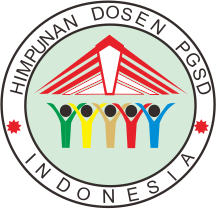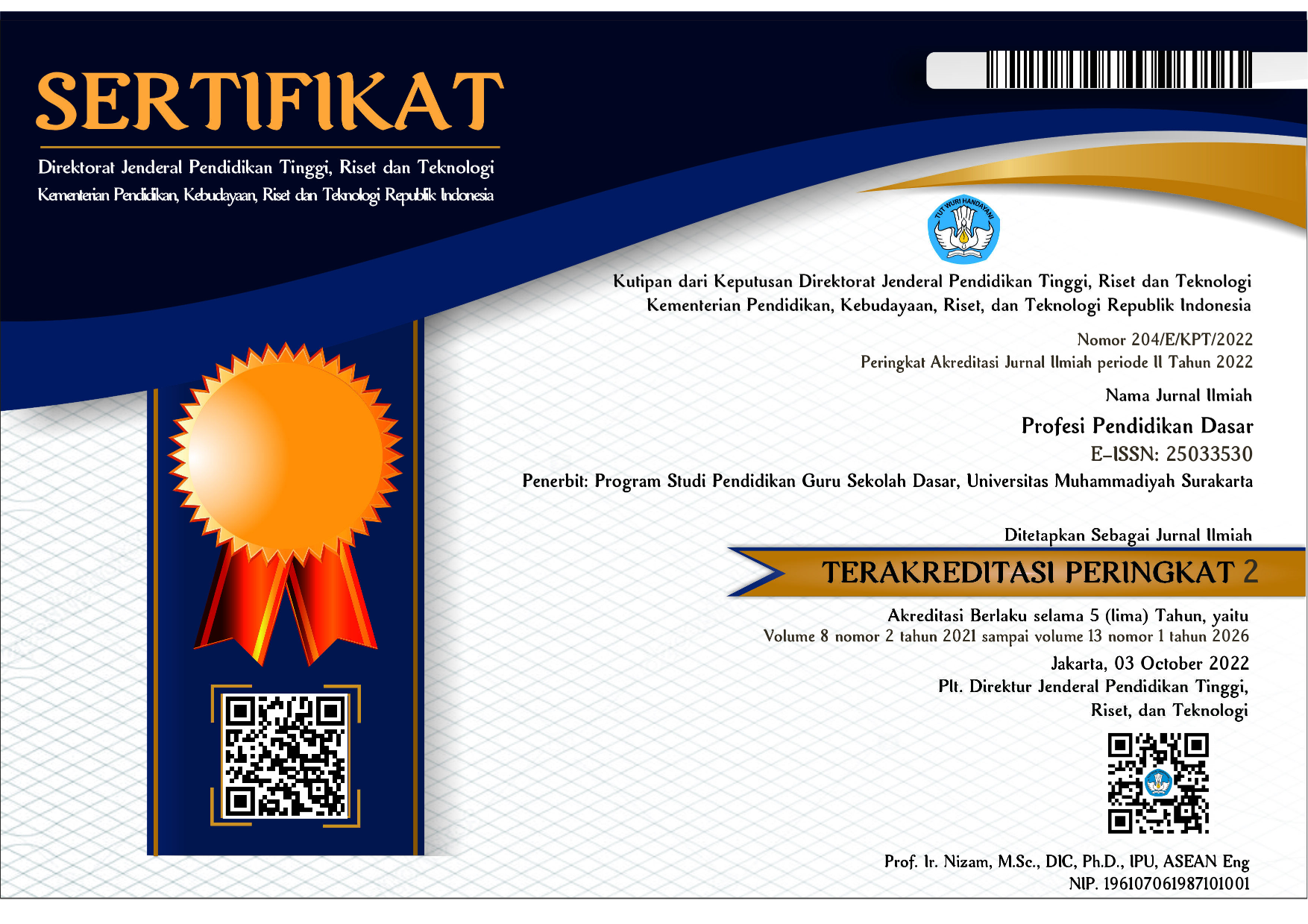EFEKTIVITAS PEMBELAJARAN BERBASIS MASALAH, PEMBELAJARAN BERBASIS PROYEK LITERASI, DAN PEMBELAJARAN INKUIRI DALAM MENINGKATKAN KEMAMPUAN KONEKSI MATEMATIS
Zaenal Abidin(1*)(1) Universitas Muhammadiyah Surakarta
(*) Corresponding Author
Abstract
The aims of this research to explains the effectiveness of increasing students' mathematical connection abilities that obtain problem-based learning, project-based learning literacy and inquiry learning. The students' connection in the mathematics of elementary school was very low. It was because students have not been facilitated to develop mathematical connection skills correctly. This research was in the form of a quasi-experimental design of The Randomized Pretest-Posttest Control Group Design. Based on the results, Problem-based learning was the most effective model compared to other learning models in facilitating mathematical connection skills. It was because problem-based learning can present problems in the context of learning that requires high-level thinking. Thus training students to always connect mathematical concepts with daily context problems. Project-based learning literacy was very effective and better than inquiry in facilitating connection skills. It was because students create literacy works that connect mathematical concepts and daily context applications. However, students were less facilitated in practising mathematical concepts. Furthermore, inquiry learning was good enough in facilitating students' connection skills. However, students have not been allowed to use mathematical concepts in the context of everyday life. Students were only facilitated to find concepts, so students have not been facilitated to develop mathematical connection skills.
Keywords
Full Text:
PDFReferences
Abidin, Y. (2013). Desain Sistem Pembelaran dalam Konteks Kurikulum 2013. Bandung: Refika Aditama.
Abidin, Z. Mathematical Learning Activity Using Connecting Organizing Reflecting Extending Model to Improve Mathematical Connection Skill. 2nd Icet Theme:“Improving The Quality Of Education And Training Through Strengthening Networking”, 986.
Abidin, Z., & Jupri, A. (2017). The use of multiliteration model to improve mathematical connection ability of primary school on geometry. International E-Journal of Advances in Education, 3(9), 603-610.
Abidin, Z., Utomo, A. C., Pratiwi, V., & Farokhah, L. (2020). Project-Based Learning-Literacy n Improving Students’mathematical Reasoning Abilities In Elementary Schools. JMIE (Journal of Madrasah Ibtidaiyah Education), 4(1), 39-52.
Bilgin, I., Şenocak, E., & Sözbilir, M. (2009). The effects of problem-based learning instruction on university students’ performance of conceptual and quantitative problems in gas concepts. Eurasia Journal of Mathematics, Science and Technology Education, 5(2), 153-164.
Bill, V. L., & Jamar, I. (2010). Disciplinary literacy in the mathematics classroom. Content matters: A disciplinary literacy approach to improving student learning, 63-86.
Cresswell, J. (2015). Riset Pendidikan: Perencanaan, pelaksanaan, dan Evaluasi Riset Kualitatif dan Kuantitatif. Yogyakarta: Pustaka Pelajar
De Graaf, E., & Kolmos, A. (2003). Characteristics of problem-based learning. International Journal of Engineering Education, 19(5), 657-662.
Endayanti, T., & Rahmawati, I. (2019). Analisis Pembelajaran Matematika Dalam Kurikulum 2013 Revisi Pada Kelas Iv Sekolah Dasar. Jurnal Penelitian Pendidikan Guru Sekolah Dasar, 7(1).
Etherington, M. B. (2011). Investigative primary science: A problem-based learning approach. Australian Journal of Teacher Education, 36(9), 4.
Firdaus, F. M. (2017). Improving Primary Students' Mathematical Literacy through Problem Based Learning and Direct Instruction. Educational Research and Reviews, 12(4), 212-219.
Greenleaf, C. L., Litman, C., Hanson, T. L., Rosen, R., Boscardin, C. K., Herman, J., ... & Jones, B. (2011). Integrating literacy and science in biology: Teaching and learning impacts of reading apprenticeship professional development. American Educational Research Journal, 48(3), 647-717.
Herlina, S., Turmudi, M., & Dahlan, J. A. (2012). Efektivitas Strategi React Dalam Upaya Peningkatan Kemampuan Komunikasi Matematis Siswa Sekolah Menengah Pertama. Jurnal Pengajaran MIPA, 17(1), 1-7.
Joyce, B., Weil, M., & Calhoun, E. (2009). Models of teaching: Model-model pengajaran. Yogyakarta: Pustaka Pelajar.
Kemendikbud (2013). Bahan Ajar Pengelolaan Pembelajaran Terpadu. Jakarta: Kemendikbud.
Komalasari, K. (2010). Pembelajaran kontekstual konsep dan aplikasi. Bandung: Refika Aditama.
Levenberg, I. (2015). Literacy in Mathematics with “Mother Goose. Literacy, 5(1).
Mahdiansyah, M., & Rahmawati, R. (2014). Literasi matematika siswa pendidikan menengah: Analisis menggunakan desain tes internasional dengan konteks Indonesia. Jurnal Pendidikan Dan Kebudayaan, 20(4), 452-469.
National Council of Teachers of Mathematics (NCTM). (2014). Principles to actions: Ensuring mathematical success for all.
OECD, P. (2016). Science Competencies for Tomorrow’s World, Volume 1: Analysis.
Ogle, D., Klemp, R. M., & McBride, B. (2007). Building literacy in social studies: Strategies for improving comprehension and critical thinking. ASCD.
Pitrianti, S. (2017). The Implementation Of Problem-Based Learning In Writing Discussion Text On Indonesian Language Learning. International E-Journal of Advances in Education, 3(9), 620-627.
Shyyan, V., Thurlow, M. L., & Liu, K. K. (2008). Instructional strategies for improving achievement in reading, mathematics, and science for English language learners with disabilities. Assessment for Effective Intervention, 33(3), 145-155.
Suwangsih, E., & Tiurlina. (2010) Model pembelajaran matematika. Bandung: UPI PRESS.
Swanson, E., Edmonds, M. S., Hairrell, A., Vaughn, S., & Simmons, D. C. (2011). Applying a cohesive set of comprehension strategies to content-area instruction. Intervention in School and Clinic, 46(5), 266-272.
Swidler, L. (2014). Dialogue Institute:“Whole Child Education” Exercise in Concept Attainment. In Dialogue for Interreligious Understanding (pp. 139-144). Palgrave Macmillan, New York.
Tan, M. (2011). Mathematics and science teachers’ beliefs and practices regarding the teaching of language in content learning. Language Teaching Research, 15(3), 325-342.
Tohir, M. (2016). Hasil PISA Indonesia tahun 2015 mengalami peningkatan. Jurnal researchgate.(1-2).
Trilling, B., & Fadel, C. (2009). 21st century skills: Learning for life in our times. John Wiley & Sons.
Article Metrics
Abstract view(s): 9250 time(s)PDF: 7434 time(s)
Refbacks
- There are currently no refbacks.


















